The Ultimate Guide to Solar-Powered Security Systems
In this comprehensive guide, we will take you through everything you need to know about the solar power security system, from how they work and the components involved, to the advantages they offer and the installation process.
I’ve always believed that some things are worth paying more for, like hotel-quality bed sheets, delicious food, extra legroom on a long flight, walking shoes that are comfortable and durable, or a reliable car, to name a few examples. If I have it in the budget, I'm generally happy to spend a bit more for that added quality or improved experience.
But there's something especially satisfying about those times when the most budget-friendly option also turns out to be the best one. Solar powered security systems are the perfect example of this. A solar powered security system offers a host of benefits that often outperform more expensive traditional systems.
Choosing the right security system for your business can be daunting, considering the plethora of options available in today's market. However, solar-powered security systems are worth considering if you're looking for a solution that combines reliability, efficiency, and sustainability.
In this comprehensive guide, we will take you through everything you need to know about solar-powered security systems, from how they work and the components involved to the advantages they offer and the installation process. If you're seeking a cost-effective enterprise surveillance solution, this guide will equip you with the knowledge to make an informed decision.
What Are Solar-Powered Security Systems?
Solar-powered security systems are surveillance solutions that use solar energy as their primary power source. They can work in a wide range of environments but are especially ideal for areas without reliable access to the electrical grid. They offer a sustainable, cost-effective solution for monitoring and security.
How Do Solar-Powered Security Systems Work?
Solar-powered security systems pull power from the sun and convert it into electrical energy. While this process might look a little different depending on the system and how it is configured, it generally requires the following key components:
- Solar panel(s): Capture sunlight and convert it into electrical energy.
- Battery: Stores the converted energy, ensuring a continuous power supply.
- Camera: The main component that captures and records video footage, powered by the stored solar energy.
- Security unit: This is the central hub upon which the solar camera is mounted. It may include additional features like flashing lights or two-way speakers.
What Are the Benefits of Solar-Powered Security Systems?
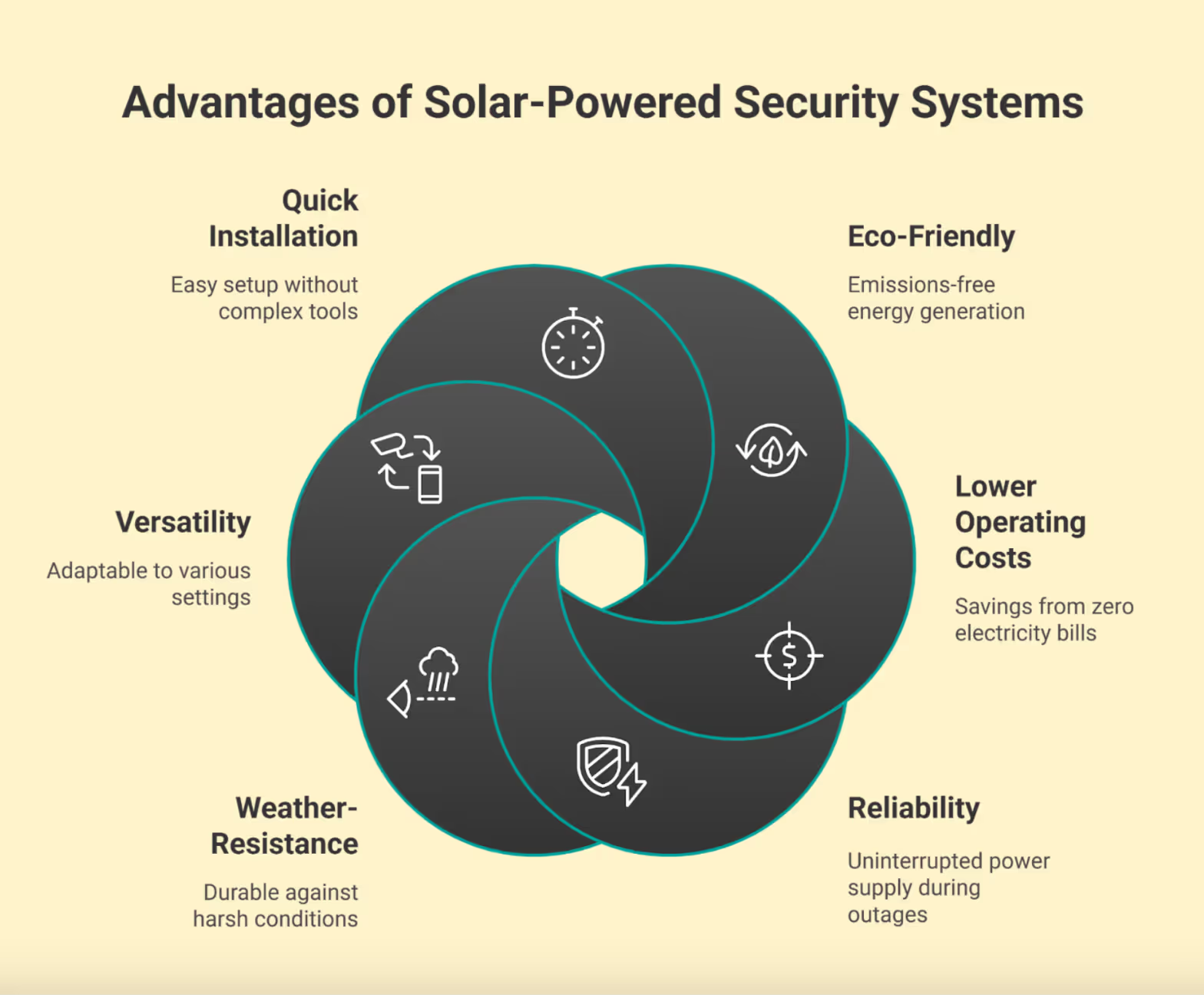
So, what makes solar-powered security systems ideal for enterprise surveillance needs across sectors? Let's explore the major advantages.
Eco-Friendly
Solar panels generate emissions-free, renewable energy; they don’t need to draw power from fossil fuel-burning grids, which release high levels of greenhouse gasses. They also integrate seamlessly into existing terrain—no need for intensive infrastructure or land disturbances—so you can implement robust security measures without messing with the local habitat.
Lower Operating Costs
One of the best parts about the sun is that it doesn't send us a bill for its services. Aside from your initial equipment investment, solar power is about as cost-effective as it gets—say goodbye to recurring electricity bills. Furthermore, independence from grid connections and generators means reduced expenses related to fuel, complex wiring, drilling, and maintenance. Overall, the minimal upkeep needs coupled with zero energy fees provide considerable savings over time.
Reliability
If there’s one thing you need your security system to be, it’s reliable. Grid power failure can leave you without electricity for hours or days following natural disasters, accidents, or other unexpected issues. A lot of damage can be done during even a very short lapse in security! Solar systems generate and store their own energy supply within the units, which makes them immune to interruptions that plague the central grid.
Weather-Resistance
Just like you wouldn’t want a security guard who doesn’t work well under stress, you don’t want a security unit that is afraid to get wet.
LVT Units—mobile, solar-powered surveillance systems—are built to withstand strong winds (seriously, one time a tornado picked one up but the unit kept working), heavy rain, and just about anything else Mother Nature can throw at them.
Versatility
The versatility of solar-powered security systems stems from their adaptability and mobility. They can be easily moved and repositioned as needed, making them ideal for a variety of settings—from construction sites that evolve daily to large events that require temporary surveillance. This mobility ensures that security coverage can adapt to changing circumstances without the need for extensive reinstallation.
Quick and Easy Installation
We’re willing to bet that pouring cement or figuring out complex wiring set-ups probably isn’t your idea of a good time—especially when time is of the essence and you need to get surveillance set up quickly. Solar-powered security systems are a game-changer in this regard. Their installation is a breeze because they don’t require specialized tools, extensive construction work, or in-depth technical expertise. You can get a solar powered security camera system set up and fully operational in under an hour.
What Are the Disadvantages of Solar-Powered Security Systems?
While the pros generally outweigh the cons for solar powered security cameras, you should be aware of some potential limitations and drawbacks.
Space Requirements
Solar panels work best when fixed in open spaces with consistent sun exposure. In constrained spaces or densely populated areas, achieving the ideal setup may be challenging. Luckily, there are plenty of options at your disposal. From large trailer units to cameras mounted on poles or buildings, LVT can provide you with a custom solution that works for your lot.
Weather Dependence
Frequent overcast conditions or shadows from nearby objects like trees or buildings can negatively impact a solar unit’s ability to charge. In most cases, this is not an insurmountable obstacle; you just need to carefully position the unit and the panels themselves.
Higher Initial Investment
Sometimes, the initial equipment investment for cutting-edge solar-powered surveillance systems will be a little bit higher than the initial investment for traditional options. However, the decades of predictable service with practically no external power expenses make solar options the more cost-effective option in the long run.
4 Key Features to Look for in Solar Surveillance Cameras
When choosing a solar power system, you must know your non-negotiables. Here are a few key features to consider.
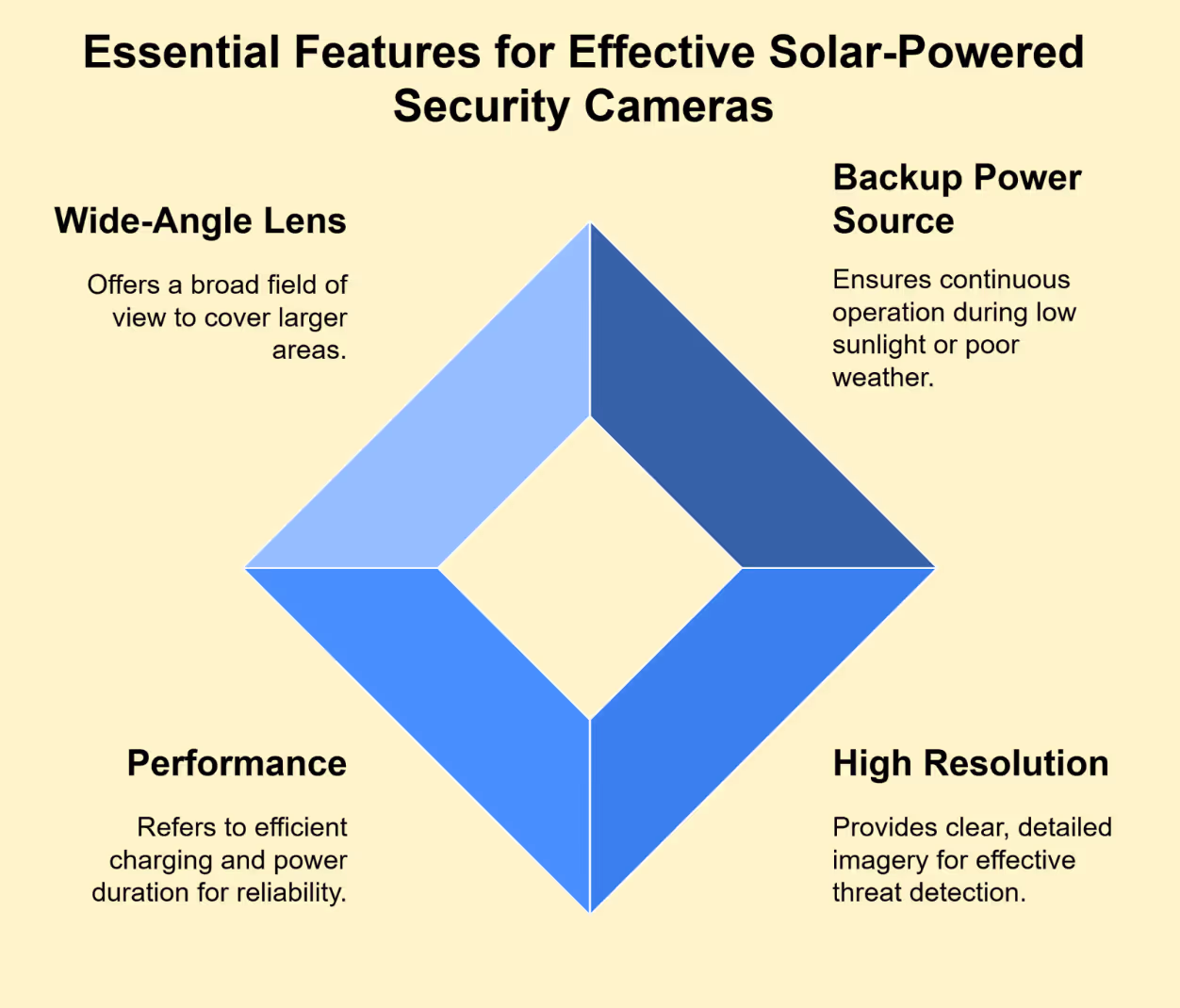
1. Backup Power Source
Although it’s uncommon, sometimes sunlight just isn’t enough to power a camera—this can happen due to shade from surrounding nearby objects or frequent poor weather. A backup power source like a smart generator can pick up the slack and allow cameras to operate when direct sunlight is scarce.
2. High Resolution
There’s a reason people wear glasses or contacts when they have poor vision—clear vision optimizes their ability to detect threats and enhances awareness of their surroundings. The same is true of an outdoor security camera. Opting for cameras with high-resolution imaging ensures sharp video quality that catches crucial details and can aid in investigations.
3. Performance
Not all solar surveillance cameras are created equal—charge times and power durations can vary significantly. Some models may offer extended periods of operation on a single charge, while others might need more frequent recharging. Even the smallest differences in a charge or power efficiency can significantly impact your overall security efforts.
4. Wide-Angle Lens
The power of surveillance lies in the breadth of its view. The solar powered camera is equipped with wide-angle lenses that offer a more expansive field of vision—some cameras even give you a full 360-degree view. This wide scope allows for comprehensive coverage of larger areas with fewer blind spots.
Solar Surveillance Camera FAQs
Still not sure whether solar surveillance cameras are the right solution for your needs? Let’s cover a few commonly asked questions.
Are solar-powered security cameras worth it?
The value of solar-powered security cameras depends on your specific needs and context. Generally, they are a great investment, especially for areas lacking reliable power supply, for people who value eco-friendly operations, or in areas where installing traditional power lines is impractical or impossible.
Do solar surveillance cameras work without Wi-Fi or electricity?
Solar surveillance cameras are powered by the sun, so they do not need access to the power grid like traditional cameras. They'll work great even for a remote location. For remote area access and data transmission, some may require a Wi-Fi connection. LVT’s solar surveillance solutions don’t require Wi-Fi—instead, they rely on cellular networks.
How well does a solar security camera work?
Solar security cameras are highly effective. They are designed to function just as smoothly as traditional cameras, with the added benefits of eco-friendliness and independence from power grid interruptions.
Do solar-powered cameras work at night?
Yes, solar-powered cameras do work at night with night vision. They store solar energy during the day in batteries, which then power the camera after dark. Even during winter or in persistent low-light conditions, most solar cameras continue to function without a hitch thanks to stored energy or backup energy sources.
Are solar-powered security systems reliable in bad weather?
Yes, many solar-powered units are designed to withstand extreme weather conditions, such as strong winds and heavy rain, ensuring continuous operation.
Are there any maintenance requirements for solar-powered security systems?
Maintenance is generally low, but it’s advisable to periodically check the solar panels for dirt or debris to ensure optimal performance.
Are solar-powered security systems suitable for all business types?
Yes, they are versatile and can be used in various environments, including construction sites, outdoor events, and remote locations.
LVT—The Ultimate Solution for Solar-Powered Security
To summarize, solar-powered security systems are an affordable, eco-friendly, and effective surveillance solution that can be quickly deployed just about anywhere. With minimal maintenance needs, resilience to power failures, and dramatically lower long-term costs, solar options provide reliable and sustainable protection.
If you’re ready to secure your assets with the power of the sun, contact our team to see how we can help.
%20(1)%20(1).avif)
